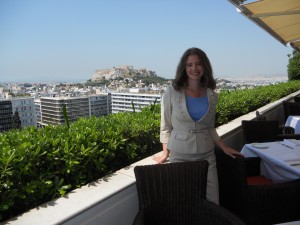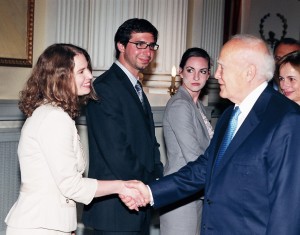Global study: Looking at Cyprus & Greece through different cultural lenses
Guest blog post by Aspasia Bartell, UW Foster School of Business MBA student
Selected from a nationwide candidate pool, second-year Foster MBA student Aspasia Bartell traveled to Cyprus and Greece this summer with the American Hellenic Institute Foundation, a Washington, DC-based, Greek-American think tank. During the trip she had the opportunity to study current foreign policy issues and the business environments in Greece and Cyprus. The delegation met with the President of Greece, ambassadors, Greek and Greek-American business leaders and other dignitaries.
We began our trip in Cyprus, a divided country since the 1974 conflict between Turkey and Greece. Northern Cyprus remains under the control of Turkish military forces, a situation regarded as an illegal occupation denounced in several United Nations Security Council resolutions. The Greek-Cypriot government in the south wants to reunify the island, but attempts to reach a solution to the dispute have so far been unsuccessful. This situation has created hardships for the Cypriot people; for example, thousands have lost their homes and businesses as a result of the occupation and continued division.
Despite the division, the Cypriot economy is doing quite well. Over the past decade Cyprus has become a magnet for Foreign Direct Investment. The Greek-Cypriot government has taken specific measures to help drive investment including putting in place a low 10% corporate tax rate and a no withholding tax policy as a means to make investing in Cyprus as simple as possible.
Next, we visited Greece in the midst of its worst financial crisis in history.
In Athens we met with Dr. Miranda Xafa, Alternate Executive Director at the Board of the International Monetary Fund, who explained the economic crisis in greater depth. She discussed how Greece has taken out the largest loan in the history of humanity. Its debt has been downgraded to junk status. Greece is more than likely to default.
Xafa then spoke about actions Greece needs to take to make progress. She spoke on how Greece needs foreign direct investment and that this investment should be from private capital. She spoke further on how the country needs to focus on its tourism and shipping industries, which make up approximately 30% of its GDP. She also believes that officials should take a thorough look at the size of its public sector.
One of the business leaders we met with was Dennys S. Plessas, Vice President of Business Development Initiatives for Europe, the Middle East, and Africa, for Lockheed Martin Aeronautics Co. He told us that Greece needs to isolate and to focus on its competitive advantage moving forward. He says the country needs to focus on exports of certain products as well as expanding its education system.
The political turmoil that accompanies this economic crisis has made addressing policy issues in Greece more difficult.
Greek officials are also dealing with an ongoing diplomatic dispute with their northern neighbor, the former Yugoslavian Republic of Macedonia (FYROM), over the name “Macedonia” itself. The Greek government maintains that the Republic of Macedonia should include a qualification such as “northern” to differentiate itself from the neighboring Greek region also called Macedonia. While Greek and Macedonian officials continue to debate the issue, the UN has agreed to accept any final agreement the two countries are able to reach.
Also, relations with Turkey still remain strained due to an increasing number of Turkish flyovers in Greek airspace. As a result, Greece finds it necessary to continue to spend a large amount of its GDP on its military, while those funds are badly needed elsewhere.
We were fortunate to meet with Dr. Karolos Papoulias, the President of Greece. President Papoulias used our visit as opportunity to thank President Obama for his political help with the financial crisis. He ended our meeting with a powerful message that the Greek people possess an incredible amount of strength and ambition and they will emerge from this crisis.
This trip was a phenomenal experience that illustrated how the world is becoming increasingly interconnected and that the business leaders of both today and tomorrow need to have an international view. During this trip I saw how leaders from different countries often view situations through their own cultural lens. The ability to recognize this and to attempt to see issues from the cultural viewpoint of another leader is an important skill when working in the international sphere.
1 Response
Leave a Reply
You must be logged in to post a comment.



Could it be more fantastic? A trip to Greece to meet top leaders at this point in time? Greece is at the epicenter of seemingly overwhelming global issues that it will take innovative business skills to resolve. While many make jokes about Greece and do nothing more than shake their heads, at this moment the opportunity to find essential solutions applicable in many other places around the world could not be greater than in that place. I’m thrilled that a Foster MBA student could be there and experience this. Aspasia is a gifted MBA student. Her Greek heritage gives her a commitment to Greece. That is a good thing for Greece’s future.